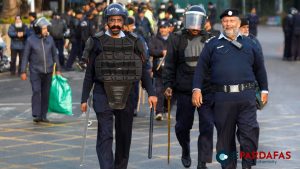
China’s Propaganda Push: Encouraging Suspicion and Fear
As China observes National Security Education Day, the nation’s top spy agency is ramping up its propaganda campaign, urging citizens to be vigilant against foreign “spies” and encouraging them to inform on each other. This initiative, analysts say, aims to instill fear of the West and tighten control over personal relationships.
Since its inception by Chinese President Xi Jinping in 2015, National Security Education Day, observed every April 15, serves to raise public awareness about safeguarding China’s national security, a fundamental interest of the government.
The Ministry of State Security, China’s feared spy agency, released a video highlighting its “top 10” major espionage cases and emphasized the importance of citizen tip-offs. The video features confessions, including one from a Chinese-American named Liang, who alleges he was recruited as a spy by U.S. intelligence, warning others not to be deceived by foreign influences.
The government’s broad definition of state secrets and frequent use of national security charges against journalists, rights activists, and online dissenters underscore the sweeping reach of its surveillance efforts.
The video also targets university students and teachers, echoing international concerns about Chinese influence on foreign campuses. Moreover, it extends its reach to Tibet and Xinjiang, where authorities assert heavy-handed control to suppress separatist and terrorist threats.
China’s counter-espionage laws have been expanded to include a wider range of activities, granting authorities greater access to corporate facilities and electronic devices. These measures have been used to target foreign consultancies, reflecting China’s determination to combat perceived threats.
Critics argue that the campaign serves to consolidate power under the Communist Party leadership, fostering a climate of suspicion and surveillance reminiscent of past political movements. The emphasis on citizen informants and the demonization of Western influences raise concerns about false accusations and miscarriages of justice.
In Hong Kong, which has seen a crackdown on dissent, National Security Education Day has become a tool for government propaganda, fueling tensions between the ruling Communist Party and pro-democracy activists.
Meanwhile, in Tibet and Xinjiang, authorities are promoting national security education through various initiatives, including public courses and community activities. These efforts aim to reinforce loyalty to the state and suppress dissent among ethnic minorities.
Overall, China’s National Security Education Day highlights the government’s commitment to maintaining control and stifling dissent, raising questions about the future of civil liberties and freedom of expression in the country.













Comments